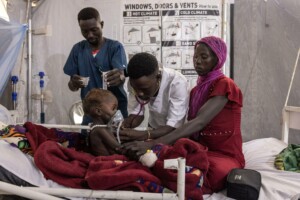Sudan OCHA bulletin 28: Sudan, South Sudan renew MoU for six months
On 7 July, the Sudanese government, the South Sudanese government, and the UN World Food Programme (WFP) extended for another six months the Memorandum of Understanding (MoU) that allows the delivery of food assistance from Sudan to South Sudan, which was initially signed in June 2014.
The two governments and WFP also signed an operational plan to implement the MoU, highlighting respective roles and responsibilities of the parties involved, the UN Office for the Coordination of Humanitarian Affairs (OCHA), reports in its latest weekly bulletin.
On 7 July, the Sudanese government, the South Sudanese government, and the UN World Food Programme (WFP) extended for another six months the Memorandum of Understanding (MoU) that allows the delivery of food assistance from Sudan to South Sudan, which was initially signed in June 2014.
The two governments and WFP also signed an operational plan to implement the MoU, highlighting respective roles and responsibilities of the parties involved, the UN Office for the Coordination of Humanitarian Affairs (OCHA), reports in its latest weekly bulletin.
To date, the agreement has enabled the timely delivery of over 20,000 metric tons of food assistance from White Nile State in Sudan to some 300,000 conflict-affected people in Maban, Melut, Renk and Wadakona in the northern part of Upper Nile State in South Sudan. These people depend primarily on food assistance delivered via this corridor.
Acute Watery Diarrhoea preparedness activities in Sudan
As the number of cholera cases in South Sudan continues to rise (724 cases including 34 deaths reported as of 6 July), the Sudanese Ministry of Health and the UN World Health Organisation (WHO) have initiated a number of Acute Watery Diarrhoea (AWD)/Cholera preparedness activities in Sudan.
OCHA reports that an AWD task force was established to actively monitor and follow-up on the situation. An AWD/Cholera Contingency Plan will target the seven high-risk states in close proximity to South Sudan (Khartoum, White Nile, Blue Nile, South and West Kordofan, and East and South Darfur).
The Ministry has sent a technical assessment and support team to White Nile state to conduct an AWD/cholera risk assessment, train healthcare workers in major hospitals and South Sudanese points of entry, and train Rapid Response Teams at the state and locality levels.
WHO is now working to procure cholera diagnostic tools through both international and local markets, and is set to receive diarrheal disease kits. The MoH has procured five tons of insecticides for fly control.
Aid arrives for 2,500 newly displaced in Mellit
According to the Government’s Humanitarian Aid Commission (HAC), an estimated 2,500 people were displaced to Mellit town after fleeing their homes in North Darfur’s Mellit locality because of inter-tribal fighting on 7 July. Six villages burnt to the ground.
The situation has now become calm, the OCHA bulletin reads. On 12 July, HAC in collaboration with local authorities began delivering aid supplies to the displaced people in Mellit town. The items include nine MT of sorghum, nine MT of millet, and 2.5 MT of sugar donated by the North Darfur governor’s office and the Darfur Regional Authority, and 250 plastic sheets and blankets donated by the Sudanese Red Crescent Society (SRCS).
Humanitarian partners will soon commence delivery of response supplies and services, following an inter-sectoral assessment mission on 14 July. A rapid response kit from the World Health Organization (WHO) has already been delivered, sufficient for 3,000 patients for three months. Adequate stocks of nutrition, sanitation and hygiene supplies in Mellit are ready for distribution, and child protections partners have dispatched recreational kits from Khartoum.
Assistance to people in Jebel Marra
Between June and July 2015, the International Committee of the Red Cross (ICRC) delivered assistance to some 237,498 people (more than 39,500 families) living in both government and non-government controlled areas of Jebel Marra.
Distributions were carried out either directly to beneficiaries, or through community leaders from the targeted areas who collected the items from temporary distribution points and took the assistance back to their villages for distribution to individual households. In total, the ICRC delivered 1.772 MT of food for seed protection, 716 MT of seeds (sorghum, sesame and groundnuts) and 60,000 agricultural tools such as hoes and rakes.
Each household received 39 kg of sorghum grains for food and 18 kg of seeds. This assistance should ensure that affected people are ready for the upcoming planting season.
Read the full bulletin here











 and then
and then